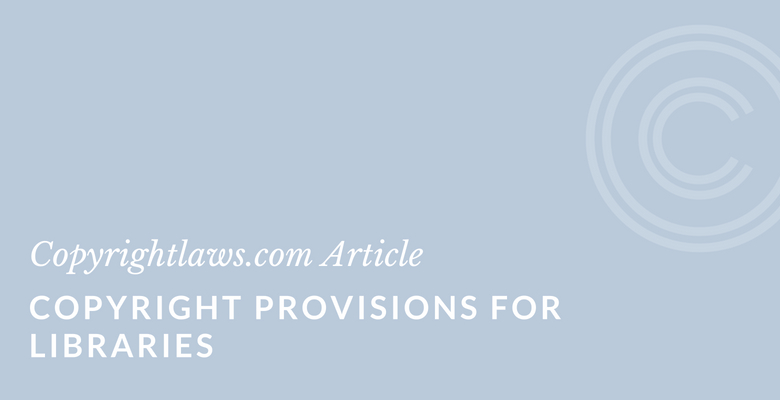
Copyright provisions for libraries, archives and museums are common in copyright laws around the world. As gatekeepers to much of an organization's content, libraries and their librarians — and also other professional staff — are often given the responsibility of copyright and licensing management.
In the overview of copyright provisions for libraries below, we discuss the unique provisions for libraries, archives and museums under copyright acts in the U.S. and around the world. You may also like A Simple Guide to Copyright for Librarians.
Our fully online Copyright Leadership Certificate program provides librarians
and other nonlawyers the knowledge and confidence to answer copyright questions
and make copyright decisions in their organizations.
Copyright Provisions for Libraries, Archives and Museums (LAMs)
Countries around the world approach special provisions for the use of copyright-protected materials by libraries, archives and museums in different manners.
These provisions are called limitations or exceptions because they limit the exclusive rights of copyright owners. In specified circumstances, they exempt libraries, archives and museums from obtaining permission from copyright holders. Such provisions can greatly assist qualifying libraries when accessing protected content.
Generally, these provisions are specific to a particular copyright statute (i.e., the copyright act of the country in question) and the conditions required for a library, archive and/or museum to benefit from the provisions.
Copyright Provisions for Libraries and Others in the U.S. Copyright Act
The special provisions in the U.S. Copyright Act are set out in section 108, titled “Limitations on exclusive rights: Reproduction by libraries and archives.” These provisions apply if:
(1) the reproduction or distribution is made without any purpose of direct or indirect commercial advantage;
(2) the collections of the library or archives are (i) open to the public and (ii) available not only to researchers affiliated with the library or archives or with the institution of which it is a part, but also to other persons doing research in a specialized field; and
(3) the reproduction or distribution of the work includes a notice of copyright that appears on the copy or phono record that is reproduced under the provisions of this section, or includes a legend stating that the work may be protected by copyright if no such notice can be found on the copy or phono record that is reproduced under the provisions of this section.
Qualifying libraries may make copies for:
- Preservation and security
- Deposit for research use in another library or archives
- The purpose of replacing a copy or phono record that is damaged, deteriorating, lost or stolen, or if the existing format in which the work is stored has become obsolete
- For interlibrary loan, subject to numerous and various conditions
Note that the U.S. provisions in section 108 only apply to libraries and archives and do not extend to museums.
For a better understanding of section 108, read the section in the U.S. Copyright Act.
In addition, section 107 of the U.S. Copyright Act, “Limitations on exclusive rights: Fair use,” may also apply to libraries and archives (even for-profit entities) if the use meets the criteria of fair use according to the factors set out in the Copyright Act.
Copyright Provisions for Libraries Around the World
Many copyright statutes have special provisions for libraries and archives (and some, such as Canada's, “bundle” the provisions for libraries, archives and museums). Each country has its own specific provisions and excepted uses that don't require obtaining permission from copyright holders.
In some countries where such provisions exist, the provisions are outdated and may only apply to traditional media (such as print books) and not to digital media. In some countries in Africa and Latin America, there are no special provisions for libraries and archives in their copyright laws.
In 2008, Kenneth Crews researched and wrote a WIPO study on library exemptions from copyright law, “Study on Limitations and Exceptions for Libraries and Archives.” The study was updated in in 2014, again in 2015 based on the results of a survey of 188 WIPO member countries, and then in 2017 based on 191 WIPO member countries. The following highlights summarize the information in the 2017 study:
- 28 countries do not have specific library provisions
- 34 countries have provisions for research or study
- 102 countries have provisions for preservation
- 98 countries have provisions for replacing deteriorating originals that are no longer available for purchase
- 22 countries have provisions for document supply
- 9 countries have provisions for interlibrary loan
- 53 countries have provisions for libraries to circumvent technological protection measures
The updated study sets out the specifics of each country’s copyright provisions for libraries and archives, beginning with Afghanistan and ending with Zimbabwe (on page 477!). For those interested in this topic, it's a thorough and fascinating study. It's also worthwhile for you to compare your own country with one or two others to see how your country fits within the international arena. Click here to see the full study.
See the fully online program, the Copyright Leadership Certificate. It's designed for librarians and other nonlawyers to provide them with the know-how to manage their organization's use of copyright-protected materials.



